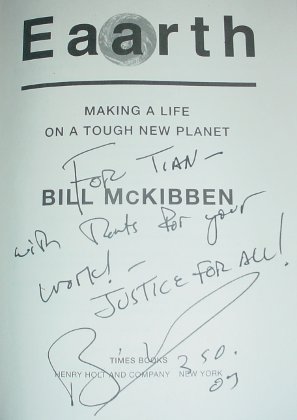I first really learned of the name
Bill McKibben when I participated in
the Step It Up thing a few years ago. It seemed like he was the
coordinator of the event or something like that, probably a difficult
job considering how huge it was. Anyhow, Gerry Gras knew much more
about him, and he invited me to ride along with him and Dana to go see
the guy on his book tour. McKibben spoke in the First Church of Christ,
a liberal church in Berkeley. It was a large church, and they filled it
with well dressed people that wanted to hear what he had to say.
In his talk McKibben quickly went
over the the things I already knew about,
but then went into some detail about what it felt like to be in
Copenhagen watching the climate change negotiations go nowhere. It was
like all those public servants just didn't have the stomach to do what
needs to be done. Then he talked a bit about the book. The blurb from
inside the front cover gives you a better overview than I can.
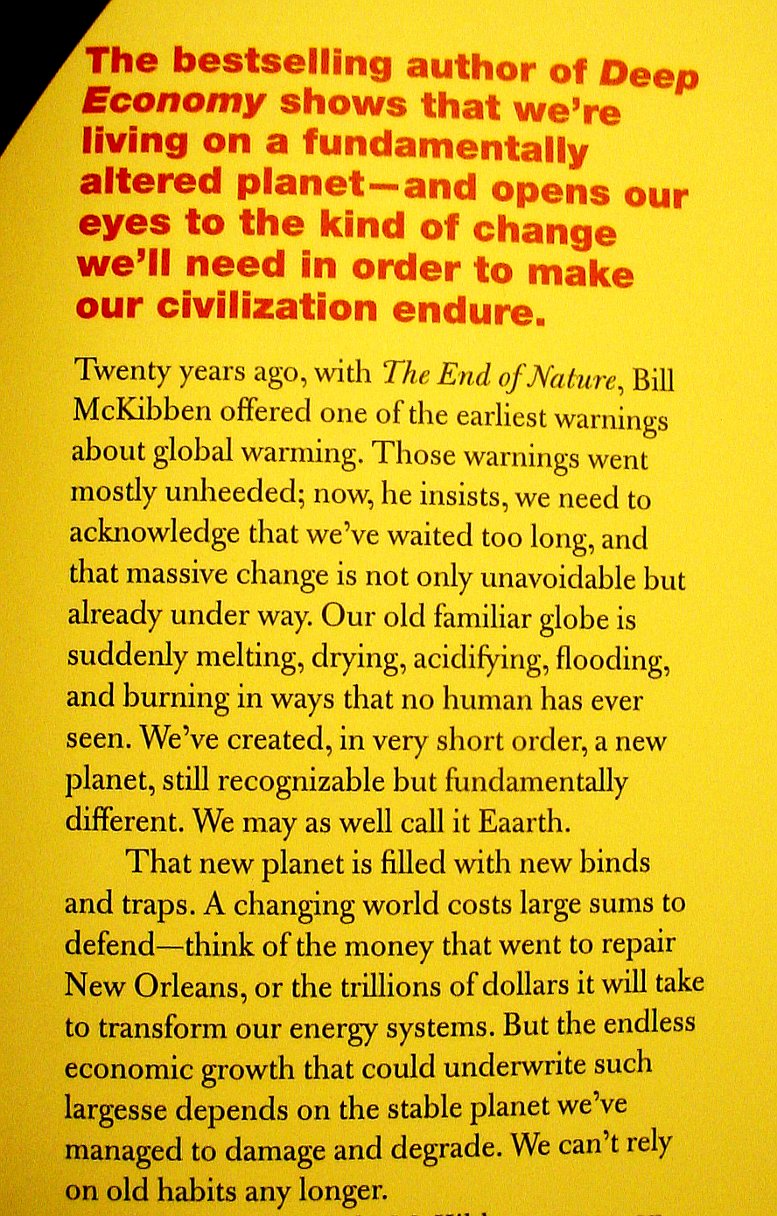
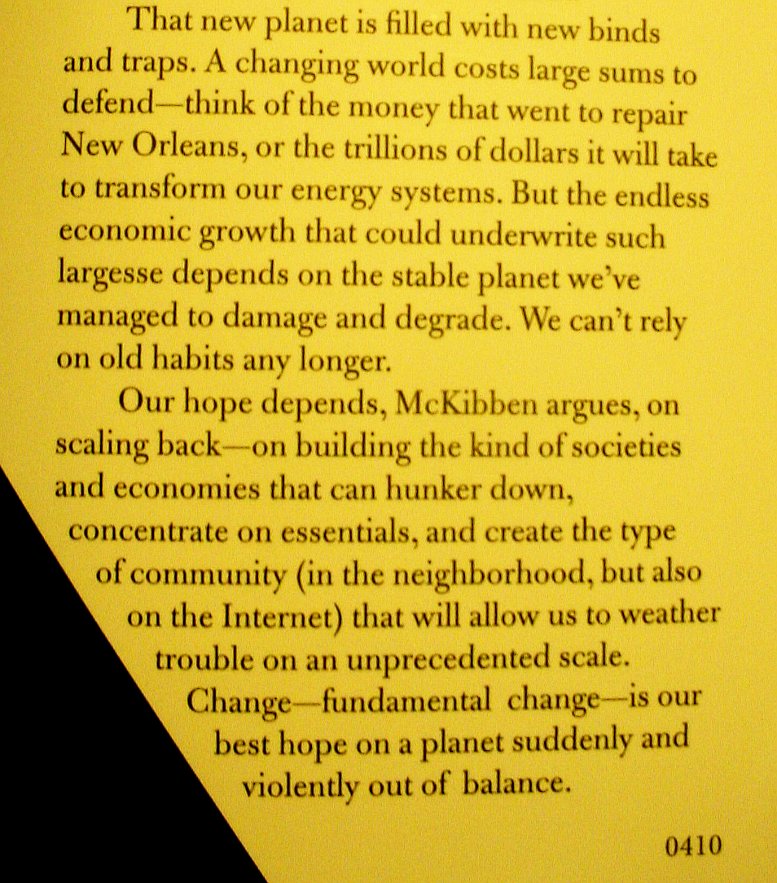
The first half of the book
contains lots of detail about how bad the problem really is. Things
like long lists of record weather disasters, and comparisons with
similar periods of time that were a bit less recent and not anywhere
near as troubled. A couple of pages of quotes from celebrities and
elected officials (Barbara Boxer, Arnold Schwarzenegger, and many
others) saying things like "we need to do something about the problem
for the sake of our grandchildren." Simple explanations of why things
have changed. Troubling predictions about the future. Things like
"right now the glaciers are melting, which means plenty of water in the
rivers. When the melt is completed, maybe around 2030 or so, those
rivers are going to be much smaller during the dry season." It's likely
to spell trouble for places that depend on them now.
The last half of the book is
devoted to the kinds of things we can do to help develop solutions to
the problem. He spends just enough space talking about all
the solutions we
should already know are part of it. We need to use a lot less energy.
We need to decentralize our energy supply. We need to eat lower on the
food chain. We need to eat more locally sourced food. We need to
redevelop local communities. We need to move away from industrial
agriculture, and towards smaller farms. The guy is a good
writer, and a lot of it makes sense. Consider this paragraph on looking
at the role of a diner.
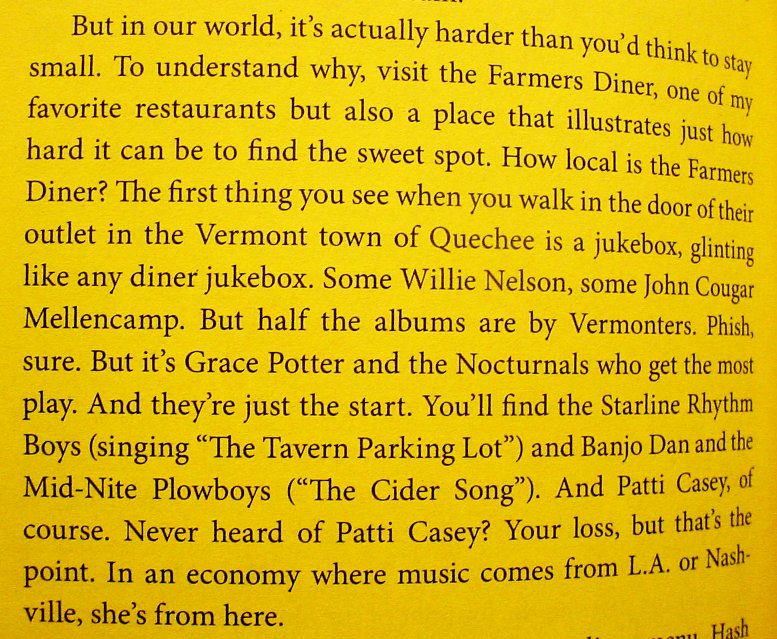
Then he talks about some of the
challenges the people behind the diner have to surmount to put a plate
of local food in front of customers. Things like nobody wants to
compete with hog farms in Utah that sell bacon for 69 cents a pound to
middlemen who are quite willing to sell the stuff for less than the
$7/lb. a small hog farmer needs to get to make a profit in Vermont.
Reading the book gives you a sense of the scale of the changes we need
to make.
The last part is a gushing
endorsement of the web as a part of the solution. He points out that
electronic volunteer activism is decentralized compared to old media,
and in many cases is more energy efficient than going there to get
information. Consider this paragraph:
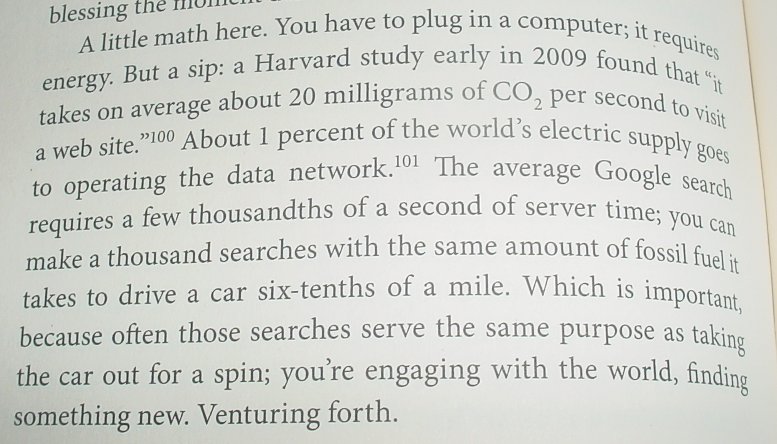
Then he talks about some great
ways to use the internet to build community. Things like a local email
list that works as a neighborhood newspaper. As the mainstream media
cuts back on local reporting, that may be one of the main things we
have to work with soon to build community.
There is some discussion about the global nature of branding. For
example, everyone on the planet probably knows what the golden arches
are all about. McKibben's horse in that battle is 350, the safe level
of carbon in the atmosphere for life as we knew it 50 years ago. (We're
already beyond that, to get there we need to cut WAY BACK on CO2
emissions and encourage all the plant life we can.) You can find out
much more about that at 350.org.
This book is a must read if the topics I've mentioned spark your
interest!
In the book he doesn't mention it,
but during his speech he said that we need to find ways to build the
movement towards sustainability by working together to make 10/10/10 a
day of action for change. I'm thinking about what I can do that day,
and I hope you are to.
Usually when I like a book this
much I pass it along when I'm done. However, McKibben did such a heart
warming job on the personalized autograph for me that I'm keeping this
one. If you want to borrow my copy, ask nicely and I'll probably lend
it to you.





